Who Was The First “Democratically Elected” President Of The United States?
In 1789, George Washington took office after being elected by only a small portion of the population of the U.S. Does that mean he wasn't "democratically elected?"
Reflecting on the death of Nelson Mandela, Cory Doctrow raises this intriguing point:
This morning, as I listened to the BBC World Service on Mandela, I found myself pondering what it meant that he was South Africa’s “first democratically elected leader.”
This is undoubtedly true. The apartheid regime held elections regularly, but only white people were given the vote. The systematic, arbitrary denial of the franchise to a large fraction of the population makes those elections “undemocratic” and their leaders illegitimate. I think that this is indisputable.
But what about US elections prior to the 19th Amendment? Was Warren Harding the first “democratically elected leader of the United States?”
And what about the UK prior to 1918 (or 1928)? Women’s suffrage came late the the UK, and if Nelson Mandela was the first democratically elected leader of South Africa, I think that makes Ramsay MacDonald the UK’s first democratically elected leader.
Or if there’s something special about gender that disqualifies it from being a prerequisite for democratic legitimacy, let’s have the apples-to-apples comparison: enfranchisement for people of color.
Black people got the right to vote in the USA in 1870, making Ulysses S Grant the first “democratically elected” leader in US history (albeit that black people were systematically disenfranchised by law, norm, and deed throughout the land, a practice that continues today, especially in states with Tea Party legislatures).
Canada didn’t give First Nations people the right to vote until 1960, making John Diefenbaker the first “democratically elected” leader in Canadian history.
One could take the analogy even further, of course. Even though the 15th Amendment extending the franchise to African-Americans was ratified in 1870, the reality of the situation was that for most off the period between that date and the passage and enforcement of the Voting Rights Act of 1965, vast numbers of African-Americans were prevented from voting by various legal and illegal means ranging from poll taxes and literacy tests to outright intimidation and violence. Does this mean that Richard Nixon, the first President elected after passage of the VRA was “the first democratically elected President of the United States” when he was elected in 1968, or, if you factor the expansion of the franchise to those between 18 and 21 years old, did that happen in 1972? It is, I would submit, not an easy question to answer, at least not as easy as it is when compared to the situation in South Africa.
When the United States of America began electing Presidents, the franchise was, for the most part, limited to white male property owners. This mirrored historical practice in England where members of Parliament were, for a very long time, elected by people meeting similar qualifications and only began to gradually expand after the American Colonies had split away from their British parent. It was no surprise, then, that when it came time to set up a form of government here the colonists largely followed the practice they were familiar with from their homeland. While these look like extremely illiberal voting rules in the context of our day, and they most certainly were, they were also more liberal than anything that existed anywhere else in the world at the time. More importantly, the history of the franchise in both the U.S. and Britain is one where the right to vote gradually expanded beyond just white male landowners, eventually to all white males, then, at least theoretically, to African-American males in 1870, and finally to women in 1920 and younger period in 1971. Other reforms that have been made over the years include things like the direct election of Senators via the 17th Amendment and, at the state and local level, the creation of voter’s power to utilize methods such as recall and initiative and referendum to have more direct control over politics at the state and local level.
Does this mean, though, that there was something illegitimate about elections held under voting laws that existed before hand? I would submit that it doesn’t, at least not in the same sense that the totalitarian nature of the apartheid regime in South Africa and the way it turned a black majority into the status of near non-citizens made a mockery of any claim by the leaders of South Africa prior to Nelson Mandela to claim that they had been “democratically elected.”
There is, I’d submit, a significant difference between an imperfectly extended voting franchise, albeit one that is far broader than any that existed elsewhere in the world, and a regime that is engaged in the systematic suppression of a majority of its population not only by denying them the right to vote, but also by denying them the right to own property, the right to engage in political protest or petition their government, the right to own a firearms, the right to run for or hold a political office, the right to live anywhere except in racially segregated ghettos,and a whole plethora of rights of equal protection under the law and due process of law, all based on the color of their skin. In the first case, you are dealing with the early days of what was considered the limits of a democratic republic, limits that gradually expanded as people became better educated, and most important expanded largely via non-violent democratic means (the Civil War being an obvious exception to that part of the equation). In the second, you’re dealing with utter and abject tyranny. When the pre-Mandela leaders of South Africa called themselves “democratically elected,” assuming that they ever actually did, it was as much of a lie as when the leaders of any of the other petty dictatorships on the African continent who are re-elected in fixed elections with 90%+ of the vote on a consistent basis. This isn’t to say that the leaders of our own nation were elected under ideal conditions, but I would suggest that those elections deserve to be viewed in a different moral context than the elections of the seven men who held the title of “State President Of South Africa” before Apartheid finally came to an end.
So, as imperfect as it may have been under present standards of what the right to vote consists of, the answer to Doctorow’s question is really quite easy. George Washington was the first democratically elected President of the United States. The franchise, while limited at the time, still made the nation unique in the world, as did our later ability to expand it on a mostly peaceful basis. Yes, you might argue that it took too long for voting rights to be expanded and that in some sense they remain under threat for some people, but that ought not undercut the legitimacy of the elections that preceded these reforms. Unlike South Africa, the United States was not a virtual dictatorship for most of the people who lived in it from 1789 until 1870 (or 1920, or 1968, or 1972) and it ought not be judged as one.
H/T: Long time OTB contributor and Forbes columnist Alex Knapp
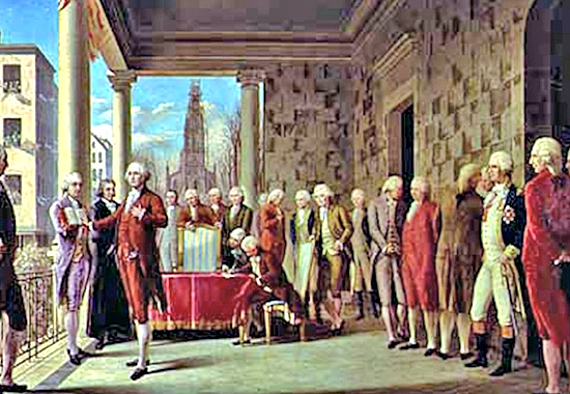

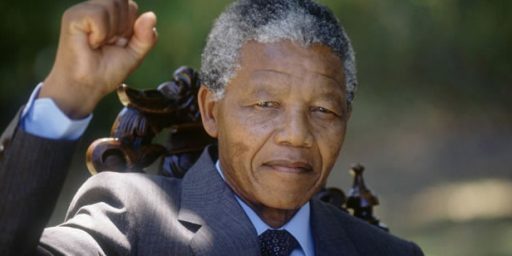
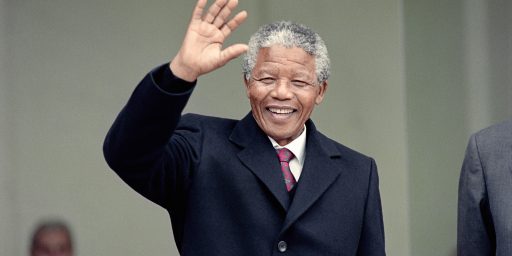
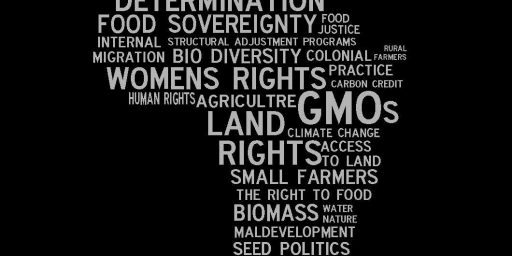
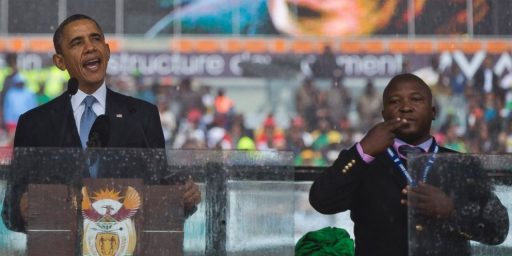

Oh dear.
You could argue it was Washington. You could argue it was Grant. You could argue it was Harding. You could even argue Nixon, which I see you’ve pointed out.
It’s one of those things that’s more worth discussing than worth deciding, if that makes sense. With time, we’ve generally expanded the franchise (2 steps forward, 1 step back). .
South Africa is pretty easy, since while there were elections prior to the Mandela election, SA was not a democratic state. There was clear regime change in terms of the apartheid and post-apartheid eras.
I would imagine its the same as places that advertise themselves as “The Original! Fill-in-the-Blank”. Everyone has a different idea or claim that puts them in precedence and disavows the others. Advertisement. A title is a title, good only for bragging rights. Most people don’t really care how “authentic” something is historically – they just wanna know if the food is good. Otherwise its just an intellectual exercise to indulge in while waiting on your drinks.
What really matters is the trend towards increasing voting rights. Head towards more freedom and choice for all, not back. A larger voting block is always a good thing. So cheers, boys!
@KM:
Of course we are seeing the opposite now as Republican legislatures pass new voting restrictions in the name of fixing a non existent problem but are really just designed to prevent minorities from voting.
It is arguable that it was a virtual dictatorship for non-whites and women for most of that time. Add those two groups up and you have a majority.
Its worth pointing out that nothing in the U.S. Constitution limited the franchise, suffrage has always initially been decided by the individual states. Not all of the people casting votes in the first election owned property, not all were white.
(IIRC, four positions existed before the 14th Amendment — (1) full black suffrage; (2) conditional black suffrage w/ some additional property/tax requirement that whites did not face; (3) unconditional black disenfranchisement; and (4) a number of states repealed full black suffrage in favor of disenfranchisement, usually fueled by recent immigrant resentment of negro status and prestige.)
No US president has ever been elected democratically, because that’s not the mechanism in our Constitution. And to PD Shaw’s comment, states also had variation regarding women’s suffrage.
I agree that just because the “democratic” elections in early US history did not satisfy modern demands on democracies it does not mean that Washington wasn’t democratically elected. The standards evolved to ever more inclusion. The old US excluded women, slaves, non citizens, non-whites and was open only to property owners.
What bugs me is that this exclusion is pretty much the same as was practiced by the ancient Greeks, but there are really Americans who think ancient Greece was not a democracy or the cradle of democracy.
@Pinky: @Pinky:
You, sir, are absolutely correct, and win ONE INTERNET !
We are a Democratic Republic. We cast votes, and then the Electoral College does it thing.
As a result, we have yet to “democratically” elect any president in these united states.
Compared to Brazil, which IS a democracy, with one person, one vote, we are not there yet.
@Tran: It may be that voting is not the sole definer of democracy, or that there might be liberal democracies and illiberal democracies. I see no reason why a slaveholding state cannot be a democracy. It would in no shape and form be a liberal democracy, at least by modern standards of liberalism. It would still be distinguishable from monarchies and tyrannies.
@KM:
Well, except when it isn’t. I’m pretty comfortable saying that it would not be an advance of freedom or democracy to extend the franchise to 6-year-olds, or to the institutionalized violent insane, or to the comatose (presumably by proxy).
…which is a pain, because once we’ve admitted that there is a line there somewhere that shouldn’t be crossed, we’re faced with the burden of figuring out where best to draw it. While recognizing that this is exactly what all of those classist, racist, sexist bigots of the past thought THEY were doing, at the time. They just got it (wildly) wrong; we hope to do better.
@PD Shaw: Different senses of the word “democracy”. It can mean broadly that the individual has a voice in the state, or it can mean specifically that each individual has an equal voice in every decision of the government. Most of the time it means something in the middle.
There has never been a democratically elected President of the United States because the President isn’t democratically elected.
He’s elected by the Electoral College, not the popular vote. In fact, there is no requirement for a popular vote at all and the states can constitutionally abolish it any time they choose. (Article II, Section 1) The state legislatures choose the presidential electors who are not bound by any popular vote.
I’m pretty sure this conversation would be better if we were all high.
@michael reynolds:
Aren’t we?
@Grewgills:
Well. . . here in California we call it medicine.
My dad always felt enormous delight hearing a few years ago that Russia finally elected their president democratically – while we have yet to do so, again due to the electoral college.
I’m having flashbacks to my undergrad international relations class and the lecture involving democratic peace theory.
Feel free to shot me at anytime.
While @michael reynolds, is probably right, I just want want to give kudos to @Pinky and @PD Shaw amoung others for adding additional nuance to the conversation.
Plot in Phulera | Property in Phulera
Looking for plots in salasar enclave? 333 Buildcon launches residential projects in Jaipur/phulera as salasar enclave. Offering affordable plots, residential apartments and residential plots in salasar enclave. Book your plots in salasar enclave now!
Since George W Bush lost the popular vote in 2000 was he democratically elected? Just asking.
@michael reynolds:
And here in Colorado… we call it “Legal for recreational use”.
See what democracy will do!
(disclaimer: I no longer inhale)
Except that I’m pretty sure all of us (except our resident frother “unmarried women having baybeez gonna DOOM the US! I tell you, DOOM!) would agree that going BACK to the suffrage of the Founding Fathers’ time would Not Be A Good Thing.
Go back and read the fulminations against granting women voting rights. Is a treat. Sounds suspiciously like the anti-SSM screeds…
And on that note, will fold my tents and steal silently away….
American Indians weren’t granted citizenship, and with it the right to vote, until 1924. Jim Crow laws weren’t wiped out until the Voting Rights Act passed in 1965. Though it rarely comes in conflict with the popular vote, we still have a system of delegates in the electoral college that isn’t proportioned directly to states’ populations. “Democratically” has a pretty elastic definition, but the case could be made that we’ve never had a democratically elected president.
More than 20% of U.S. citizens can’t vote. I’m serious. More than one in five. They’re called children.
Why should we have a democratically elected President? We are NOT a democracy; we are a REPUBLIC.
@Maggiemama: A republic means not having a king or a nobility and having sovereign power derives from the people.
A republic governs by electing representatives.
For a republic to properly function, the majority of the electorate has to be able to choose its representatives.
Washington and Jefferson were elected by Congress. It wasn’t until Adams that we held a popular vote
@Maggiemama: we are a demicratic republic. We employ representative democracy, as versus direct democracy. Both are forms of democracy
@Ronbo: Washington was elected by the electoral college (as was Adams). The House had to break an electoral college tie between Jefferson and Burr in 1800.
The method of choosing electords varied by state and it did not become common (and then universal) practice for them to be chosen by popular vote until later in the 19th century.